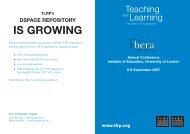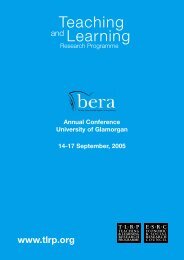Education, schooling and learning for life - Teaching and Learning ...
Education, schooling and learning for life - Teaching and Learning ...
Education, schooling and learning for life - Teaching and Learning ...
You also want an ePaper? Increase the reach of your titles
YUMPU automatically turns print PDFs into web optimized ePapers that Google loves.
Now widely dispersed within one urban<br />
area, the study involved data-gathering<br />
in four comprehensives, a grammar<br />
school, a city technology college <strong>and</strong> four<br />
independent schools. We applied our<br />
underst<strong>and</strong>ing of <strong>learning</strong> processes, pupil<br />
career <strong>and</strong> social factors in assessment to<br />
these contexts, with particular reference to<br />
strategic action, the shaping of identity <strong>and</strong><br />
the influence of social class <strong>and</strong> gender,<br />
both inside <strong>and</strong> beyond the schools.<br />
We identified a strong pattern in pupils’<br />
identity experiences by school type.<br />
In Figure 2 below, we summarise the<br />
differentiating <strong>and</strong> polarising effects arising<br />
from the cultural match <strong>and</strong> mismatch in<br />
these different settings.<br />
This analysis highlights the relative<br />
continuity <strong>and</strong> internal consistency between<br />
the values <strong>and</strong> expectations of the<br />
independent <strong>and</strong> selective schools, <strong>and</strong><br />
the families <strong>and</strong> peer groups associated<br />
with them. There was relative clarity in the<br />
circumstances in which each individual<br />
pupil sought to maintain a viable identity<br />
<strong>and</strong> manage their strategic biography.<br />
Such shared underst<strong>and</strong>ings offer fertile<br />
ground <strong>for</strong> personalised provision.<br />
Many of the skilled working class families<br />
offered quality time <strong>and</strong> emotional support<br />
<strong>for</strong> their children. They enabled a range of<br />
out of school cultural <strong>and</strong> sporting activities<br />
(including music, dance, drama, rugby,<br />
football, gliding, diving) <strong>and</strong> derived<br />
considerable pleasure from their children’s<br />
experiences. Nevertheless, such parents<br />
were sometimes disadvantaged in relation<br />
to school systems in that their knowledge,<br />
confidence or interpersonal skills often failed<br />
at crucial times.<br />
Indeed, the comprehensive school<br />
pupils in our study often experienced<br />
disparities in the discourse, values <strong>and</strong><br />
expectations of significant others in their<br />
homes, schools <strong>and</strong> peer groups. The<br />
achievement of viability within such varied<br />
contexts resulted in the development of<br />
more fragmented identities, which in turn<br />
embedded the potential <strong>for</strong> future disruption<br />
in approaches to <strong>learning</strong> <strong>and</strong> patterns<br />
of strategic action. Continuity in the<br />
development of strategic biographies<br />
appeared to be harder to achieve <strong>for</strong> these<br />
pupils. For this reason, the achievement of<br />
authentic personalised provision is likely to<br />
be more important <strong>for</strong> these learners, but<br />
also harder to establish <strong>and</strong> sustain.<br />
Major implications<br />
This research traced how social influences on<br />
<strong>learning</strong> broaden as young people develop. It<br />
illustrates why an awareness of <strong>learning</strong> as a<br />
social activity is important, <strong>and</strong> why <strong>learning</strong><br />
should be seen in relation to the development<br />
of identity over time.<br />
Our analysis st<strong>and</strong>s in stark contrast<br />
to the narrow target-setting of many<br />
contemporary, centrally directed, education<br />
systems. Such approaches tend to<br />
emphasise <strong>for</strong>mal aspects of provision<br />
<strong>and</strong> to over-simplify teaching <strong>and</strong> <strong>learning</strong><br />
processes. Maximising the potential of<br />
children <strong>and</strong> young people calls <strong>for</strong> a more<br />
appropriate underst<strong>and</strong>ing of them as social<br />
actors within their cultures <strong>and</strong> communities,<br />
<strong>and</strong> of how education fits into, <strong>and</strong><br />
contributes to, their lives as a whole.<br />
This analysis complements studies of factors<br />
associated with differential educational<br />
outcomes by identifying social processes<br />
which could help to account <strong>for</strong> them. The<br />
Identity <strong>and</strong> <strong>Learning</strong> Programme shows how<br />
individual students struggle to cope with their<br />
circumstances <strong>and</strong>, in so doing, reproduce<br />
some issues <strong>and</strong> construct others anew.<br />
The bottom line is that social contexts,<br />
both within <strong>and</strong> beyond <strong>for</strong>mal educational<br />
institutions, have enabling or constraining<br />
effects on <strong>learning</strong> as the strategic<br />
biographies of learners are played out.<br />
Patterns in provision will there<strong>for</strong>e have<br />
consequences in terms of patterns of<br />
outcome. National <strong>and</strong> local governments,<br />
<strong>and</strong> those who lead or work in schools, have<br />
very significant responsibilities in this respect.<br />
New approaches to personalised provision<br />
are unlikely to be able to fully overcome<br />
structural influences on <strong>learning</strong> outcomes.<br />
One educational representation of ‘<strong>learning</strong><br />
through the <strong>life</strong>course’ is offered below in<br />
Figure 3.<br />
The consideration of such models <strong>and</strong> the<br />
relationships, processes <strong>and</strong> narratives which<br />
underpin them indicates the potential <strong>for</strong><br />
qualitative longitudinal studies in highlighting<br />
connections between different spheres <strong>and</strong><br />
phases of <strong>life</strong>.<br />
Figure 3: Social influences on learners though<br />
the <strong>life</strong>-course<br />
Put more gr<strong>and</strong>iosely, the development of<br />
personal identity <strong>and</strong> of narratives as ways of<br />
creating meaning through <strong>life</strong> is of enduring<br />
significance <strong>for</strong> humankind. Such ideas are<br />
deeply embedded within our cultures through<br />
concern <strong>for</strong> personal development. However,<br />
the modern world presses remorselessly<br />
<strong>for</strong> short-term per<strong>for</strong>mance in the drive <strong>for</strong><br />
economic competitiveness <strong>and</strong> efficiency,<br />
<strong>and</strong> implicitly undermines other concerns <strong>for</strong><br />
quality of <strong>life</strong> <strong>and</strong> social justice. There are<br />
indications that such imbalances can have the<br />
unintended consequence of depressing social<br />
adjustment <strong>and</strong> long-term motivation, <strong>and</strong> can<br />
create <strong>and</strong> amplify exclusion. In the case of<br />
education, such issues raise fundamental<br />
questions about the most appropriate<br />
conceptualisation of <strong>learning</strong>, teaching <strong>and</strong><br />
education <strong>for</strong> modern societies. Authentic<br />
<strong>for</strong>ms of personalisation, in this context, are a<br />
very significant challenge to the system as a<br />
whole, as well as to the classroom practices<br />
of teachers.<br />
Work on such issues is being undertaken in<br />
the UK by many academics <strong>and</strong> in a number<br />
of current initiatives, including some within<br />
the TLRP. This large programme is building<br />
on key ideas explored within Identity <strong>and</strong><br />
<strong>Learning</strong> Programme <strong>and</strong> elsewhere to<br />
contribute to a meta-narrative across some<br />
70 projects distributed across the <strong>life</strong>course.<br />
Competition <strong>and</strong> ‘choice’ between schools<br />
in this city thus produced differentiated<br />
educational experiences <strong>and</strong> reproduced<br />
inequalities.<br />
Summary<br />
English school children are extremely<br />
active in the construction <strong>and</strong> negotiation<br />
of their lives, whether at home or in<br />
playground <strong>and</strong> school settings. Children,<br />
teenagers <strong>and</strong> others act, however, within<br />
the particular historical, economic, political<br />
<strong>and</strong> cultural context of their communities<br />
<strong>and</strong> society. This produces discrepancies<br />
of resource <strong>and</strong> opportunity associated<br />
with social class, gender <strong>and</strong> ethnicity,<br />
<strong>and</strong> in the ways in which particular<br />
priorities <strong>and</strong> structural inequalities are<br />
expressed through the education system.<br />
Figure 2: Match <strong>and</strong> disparity in contexts, identities <strong>and</strong> <strong>learning</strong> strategies<br />
<strong>Teaching</strong> <strong>and</strong> <strong>Learning</strong> Research Programme<br />
www.tlrp.org

















